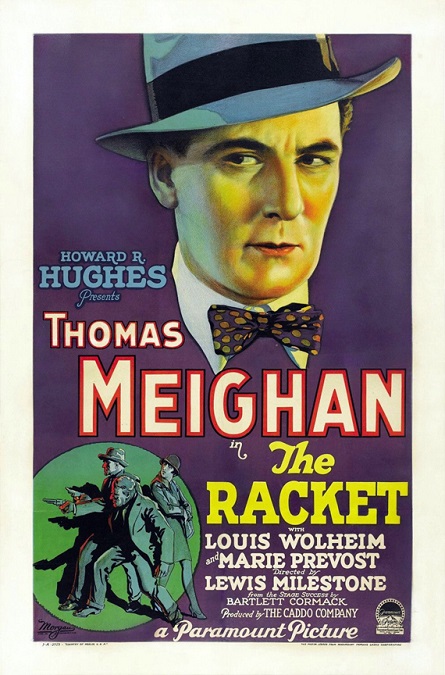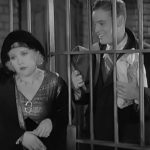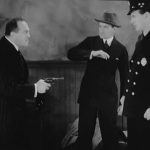

The Racket –1927 / 1928
I have to say, this was a rather average movie, even by the standards of the late 1920s. It was a silent film, complete with dialogue cards and continuous music, which in those days would probably have been played live at the cinema by an organist. The version of the film I watched had a re-done soundtrack by Robert Israel in 2004, which had been arranged for a full orchestra. It starred Thomas Meighan, Louis Wolheim, Marie Prevost, Henry Sedley, George E. Stone, Sam De Grasse, Richard “Skeets” Gallagher, Lee Moran, and John Darrow.
Before getting into the film’s plot, acting, and directing, I did find an interesting little bit of drama surrounding the film itself. According to Wikipedia, only one original copy of the film is known to exist. “It was long thought lost before being located in Howard Hughes’ film collection after his death.” I don’t know. I would guess that since it had been nominated for Outstanding Picture, someone would have thought to preserve a copy of the film simply for its historical value. It was only sheer luck that the famous philanthropist happened to keep a copy of the movie in his personal collection.
Anyway, as average a film as it was, I have been questioning why The Racket was nominated for the top prize. I can think of three reasons. First, the movie was based on a 1927 Broadway play of the same name. This tells me that it was a popular story that was fresh in the minds of theatre-goers. Second, it apparently dealt with a hot issue of the day, namely gangsters and a corrupt police department and government officials. For this reason alone, both the play and the movie were actually banned in Chicago. And third, this was the very first Academy Awards. They were still trying to figure out what really constituted a worthy nomination for the Outstanding Picture award.
My first two suggestions are certainly valid. Other movies have been nominated for lesser reasons than those: popularity and social relevance. My third speculation is little more than a guess on my part, but the reason I have to consider it is that I look at the two other movies it was up against in the Outstanding Picture category at that first awards ceremony. First was a movie called Seventh Heaven. This was a wonderful film that was innovative in both its story-telling, and its cinematography. It had a great cast that portrayed some pretty complex and fascinating characters. And then there was Wings, the first movie to ever take home the top honor. Wings was a thrilling war drama with some amazing action sequences, impressive special effects, and a gripping and poignant climax. The Racket just doesn’t measure up.
This was the story of a driven and dedicated police officer named Captain James McQuigg, played by Meighan. His arch nemesis is the gangster, Nick Scarsi, played by Wolheim. The plot follows Captain McQuigg as he does what he can to build a case against the murderous gangster. But he seems to be blocked at every turn. Scarsi has both police and politicians in his pocket. When any of his men are arrested, a writ of habeas corpus suddenly appears, demanding that they be released. However, just as an interesting side note, I did a little reading and found the movie got it wrong. A writ of habeas corpus cannot legally release an unlawfully arrested or detained suspect. What it can do is demand that the suspect be taken to a court to determine the validity of the arrest. It is not a “get out of jail free” card.
And what would a big Hollywood film of the 1920s be without a romance. In steps Helen Hayes, played by Marie Prevost. She is a nightclub dancer who has designs on Nick’s younger brother, Joe, played by Stone. Joe isn’t a criminal like Nick, but he also isn’t a nice guy. He tries to get fresh with her, and when she rejects his advances, he tells her to get out of his car and walk home. She flags down a copper who tries to lean on Joe for being a jerk to the young lady. Joe runs and a car chase ensues. Joe is caught and arrested, and Helen is detained as a witness.
With Joe in prison, McQuigg has the means to get at Nick. Nick arrives at the police station while McQuigg is out. He tries to bribe an officer to free his brother, but is refused. Nick then murders the officer and punches out a handsome young reporter named Dave Ames, played by Darrow, who has taken a liking to Helen. He goes out of his way to be nice to her, and she starts to fall for the boy. But the nail in Nick’s coffin is the dirty politician, who McQuigg convinces to turn against the gangster. When he is at last cornered, Nick tries to murder his arch rival and make a run for it, but he is shot and killed by the D.A., Mr. Welch, played by De Grasse.
The plot wasn’t special or unexpected. The directing of Lewis Milestone wasn’t inspiring or innovative. The action wasn’t that thrilling and the romance wasn’t that deep. The acting was passable for a silent film, though I will say that Meighan, playing the main protagonist, was completely outshone by his co-star, Wolheim, who was far more interesting to watch on the screen. The Racket wasn’t a bad film, but it just didn’t seem to be on the same level as its rivals.








